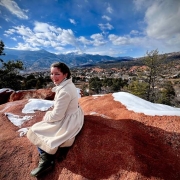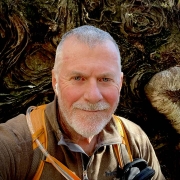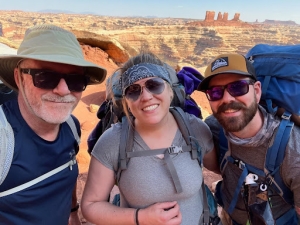It is Hard to Be Soft | Healthy Aging Series: S9 E25
This is a guest blog written by Rommie Oshrieh Neese. Consider it to be an extension to Season 9 of the Healthy Aging Series.
This is a reflection on “The Happiest Man on Earth: The Beautiful Life of an Auschwitz Survivor’ by Eddie Jaku
Are you happy? How many times have you been asked that question? How many times have you asked yourself? How many times have you said, “Yes, I am happy?”
I am happy.
Real Happiness
Eddie Jaku’s memoir “The Happiest Man on Earth, The Beautiful Life of an Auschwitz Survivor” is what I have been searching for. It is a book about a young man’s experience in the worst concentration camp, if it is even possible to discern one from the other. It is a book about the impact it had on Eddie’s life, before, during, and after the nightmare.
In the face of starvation, immense and unimaginable pain, anger, grief, defeat, degradation, Eddie found happiness. It is possible. No matter a person’s circumstances, it is possible. Eddie shares his miracle with the world that happiness is within us. Eddie’s memoir captures how human beings can find happiness in the dark, and I mean the dark.
I remember the lights going out in Kentucky’s Mammoth Cave. You can see nothing. Your eyes do not adjust. Imagine dying that way. Imagine the fear and despondence of knowing that is your fate, as it has been for your parents, your children. Even your beloved pets were accused of being “Jewish” then stabbed to death. Yet, Eddie found happiness? How? Written on his first page, he endeavors to show us how. There are many things Eddie’s readers can take away from his story. I am not here to retell the Holocaust. That has been successfully done by those who survived it.
My take away is quietly knowing that softness can lead to survival. That softness leads to happiness. It does for me. Eddie found happiness in the dark, through the softness of his being. That is strong. That is survival. It is proof enough for me that I can live my life happily through my own nature. My softness.
Real Softness
I want to believe that softness solves problems. I want to believe that softness prevents problems to begin with. That softness does not mean weakness. Softness can be achieved through practice. This in and of itself signifies that it is hard to be soft. It can be done though, with practice. As much as we do that requires practice, imagine what practicing softness could do. Imagine a problem you have being approached through softness. How might it change the outcome? I am by no means suggesting that softness means to resolve one’s self of assertion or to suppress feeling. I am suggesting that softness is an option. An alternative to violence, physical or emotional. Softness is an underutilized tool that we do not value enough to try. Try. Give it a chance.
Faux Strength
Violence is an act of weakness, out of a stumbling and shameful fear. There is nothing mysterious about that. Eddie is my teacher and advocate…for softness. I am not placing him on a pedestal. I imagine he would object to it. And I will not, by any means, attempt to recapture his life…but I will pass it onward in a mutual effort to change the world, softly. He knows how. I believe him. Day after day, night after night, years immersed in violence, Eddie suffered physical and emotional torture most people only see in the most grotesque of Hollywood films. Some of those films seek to capture the truth…the truth of what evil is a capable of, of inhumanity, absurdity, and senselessness. The weakness of people. Where is the softness?
Eddie managed to keep a soft heart in a hard, brutal, humiliating prison of grief and torture. He remembered his family. He remembered his life. He remembered himself.
He managed to stay true to who he was–a decent, smart, strong, hopeful, and soft-hearted man. Do those films appeal to your soft side? If so, that is good. If they make you angry, that too is good. Just remember that Anne Frank still believed that “in spite of everything, that people are truly good at heart.” Remember that Fred Nietzsche warned that “Anyone who fights with monsters should make sure that he does not become a monster.” Remember that Confucius believed that “Only when a mosquito lands on your testicles, you will truly learn that there is always a way to solve problems without using anger or violence.”
Real Strength
I am lucky. I feel it in my gratitude. I am empathetic, and believe me when I tell you, there is a cost for it. It costs me my peace, at times. It is my values, my morals that keep me civil. Like Eddie. Empathy helps, but it can drive anger, my anger–a deep, writhing fury within for the unspeakable physical and emotional torture and suffering–joyfully inflicted by people onto each other.
If I give in to the anger, much like our friend, Luke Skywalker, was able to resist (yes, Star Wars offers wisdom to the young and impressionable as well as to the aging, who are still looking for it), I will become the monster (not heeding Nietzsche’s warning), and the cycle of suffering continues–through me.
No. I will not succumb to the weakness of evil, the weakness of harming others, the weakness of hate, the weakness of violence. I am soft. I notice how anger affects my softness. It is okay to feel anger. It is not okay to harm others as a result of it. As you can see, millions of people, same as you and me, suffered an agonizing, dehumanizing death by angry, weak, primitive, ignorant, violent “dividers” of people.
Eddie lived through it. And he is soft. Is there anything about his survival that is weak?
It is hard to be soft.
It is my experience and observation that it is far more challenging to be soft in the face of adversity. It is a mark of intelligence, of evolution, to be soft, to be empathetic towards others.
A hero knows they can beat the oppressor; they can “win”. But, instead, they take pity, leaving them where they stand, with a choice–changing the world one “peace” at a time, offering the “bad guy” an opportunity to not be what they are. It is how Christopher Reeve was inspired to portray “Superman”. Eddie is a Superman. He asked, “Why?” Eddie asked the SS Nazi, caught like a rabid zombie, why? Why would you do this? He was weak and could not answer Eddie’s fair question.
I have made mistakes. I am not always soft. I am certain Eddie has made mistakes, too. We are human. Softness does not have to be reduced to feminine or masculine. It is human. Softness is necessary for survival. There are times when my softness makes me feel exploited and walked on, bullied…then I get angry!
My whole life, I have been told, taught, that my softness is weak, a shortcoming. I will remember Eddie in those moments when lashing out would be easy. I will remember that softness is strong. That softness can be my answer. And I will be happy. I will be happy because I made a choice to be. I will remember that it is hard to be soft, but I can choose to be who I am. To be soft. Thank you, Eddie. Yes, we are friends. Most certainly, we are friends.
~Rommie Oshrieh Neese
2-26-2024, In memory of my mother on her birthday













